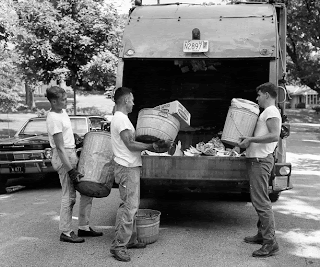After much deliberation, I've decided simply to post this poem, and see what you folks might make of it - without my guidance. Consider the title, the speaker (we call the narrator of a poem, the speaker) the images throughout, etc. Have at it ladies and gentlemen; I am eager to see what you have to say.
Garbage Truck
by Michael Ryan
Once I had two strong young men hanging off my butt
and a distinctive stink that announced
when I was inching down your street
at the regal, elephantine pace
that let my men step down from me running
to heave your garbage into my gut
then fling the clanging metal cans
to tumble and rumble, crash and leap
back to sort-of-where you'd lugged them to the curb
before another oblivious night of sleep.
Did you think life was tough?
I reveled in it, all the stuff
you threw out, used up, let rot,
the pretty packaging, the scum, the snot,
vomit and filth, everything you thought
useless, dangerous, or repugnant:
I ate it for breakfast. I hauled it
out of sight. And what did I get?
You were annoyed by my noise.
You coughed at my exhaust.
Your kids stopped playing in the street
to pinch their noses and gag theatrically
with no clue how sick they'd be without me.
I was the lowest of the low, an untouchable,
yet I did what I did and did it well.
Now I am not laughable: a "waste management vehicle"
denatured robotic sanitized presentable.
My strong young men are gone. I have no smell.
I'm painted deep green to look organic and clean.
Your "residential trash carts" are matching green
injection-molded high-density polyethylene
that barely thuds when I lower them to the ground
after I've stabbed and lifted and upended them
with twin prongs that retract into my side
so not to scratch anything or scare anyone.
Who can complain? Right there on your street
I mash and compact and obliterate your waste.
You need never give it a second thought.
It's safe it's easy nobody gets dirty.
It's how you want your life to be.
But life's not garbage. Garbage is life.
Look what you've got. Look what you throw out.





